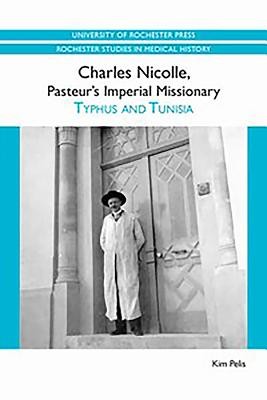
- We will send in 10–14 business days.
- Author: Kim Pelis
- Publisher: University of Rochester Press
- ISBN-10: 1580464653
- ISBN-13: 9781580464659
- Format: 15.2 x 22.9 x 2.2 cm, softcover
- Language: English
- SAVE -10% with code: EXTRA
Reviews
Description
Kim Pelis uses a wide range of French and Tunisian archival materials and a close reading of Nobel Prize-winning bacteriologist Charles Nicolle's scientific papers and philosophical treatises to explore the relationship of scienceand medicine to society and culture in the first third of the twentieth century.
This book examines the biomedical research of Nobel Prize-winning bacteriologist Charles Nicolle during his tenure as director of the Pasteur Institute of Tunis. Using typhus as its lens, it demonstrates how the complexities of early twentieth century bacteriology, French imperial ideology, the "Pastorian mission," and conditions in colonial Tunisia blended to inform the triumphs and disappointments of Nicolle's fascinating career. It illuminates how thesediverse elements shaped Nicolle's personal identity, the identity of his institute, and his innovative conception of the "birth, life, and death" -- or, the emergence and eradication -- of infectious disease.Kim Pelis blends exhaustive archival research with a close reading of Nicolle's written work -- scientific papers, philosophical treatises, and literary contributions -- to explore the complex relations between biomedical ideas and socioculturalcontext. The result is a study that will be of interest not only to students of French history, colonial medicine, and the history of the biomedical sciences but also to anyone seeking to understand how individuals have attemptedto deal creatively with complex times and ambiguous knowledge. Kim Pelis, a medical historian by training, is a writer for the director of the National Institutes of Health.
EXTRA 10 % discount with code: EXTRA
The promotion ends in 20d.06:00:46
The discount code is valid when purchasing from 10 €. Discounts do not stack.
- Author: Kim Pelis
- Publisher: University of Rochester Press
- ISBN-10: 1580464653
- ISBN-13: 9781580464659
- Format: 15.2 x 22.9 x 2.2 cm, softcover
- Language: English English
Kim Pelis uses a wide range of French and Tunisian archival materials and a close reading of Nobel Prize-winning bacteriologist Charles Nicolle's scientific papers and philosophical treatises to explore the relationship of scienceand medicine to society and culture in the first third of the twentieth century.
This book examines the biomedical research of Nobel Prize-winning bacteriologist Charles Nicolle during his tenure as director of the Pasteur Institute of Tunis. Using typhus as its lens, it demonstrates how the complexities of early twentieth century bacteriology, French imperial ideology, the "Pastorian mission," and conditions in colonial Tunisia blended to inform the triumphs and disappointments of Nicolle's fascinating career. It illuminates how thesediverse elements shaped Nicolle's personal identity, the identity of his institute, and his innovative conception of the "birth, life, and death" -- or, the emergence and eradication -- of infectious disease.Kim Pelis blends exhaustive archival research with a close reading of Nicolle's written work -- scientific papers, philosophical treatises, and literary contributions -- to explore the complex relations between biomedical ideas and socioculturalcontext. The result is a study that will be of interest not only to students of French history, colonial medicine, and the history of the biomedical sciences but also to anyone seeking to understand how individuals have attemptedto deal creatively with complex times and ambiguous knowledge. Kim Pelis, a medical historian by training, is a writer for the director of the National Institutes of Health.


Reviews